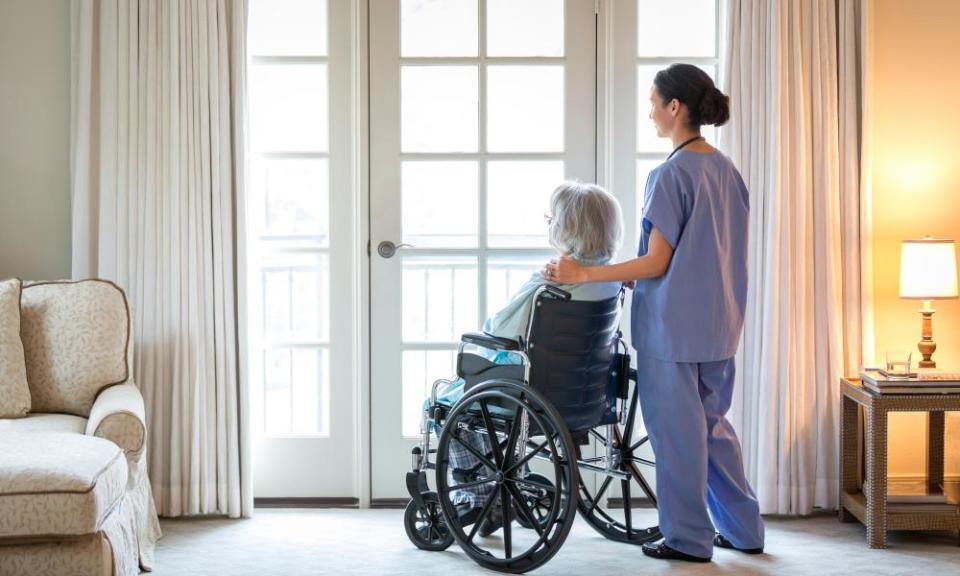Industry stakeholders strike deal that could lead to pay rise for Australian aged care workers

Aged care providers and unions have quietly struck a deal acknowledging the increased complexity and value of aged care work, a key step in a case seeking pay rises of up to 25%.
Aged care stakeholders lodged a consensus statement shortly before Christmas as part of the union-run case arguing for pay rises of at least $5 an hour, although the in-principle agreement about work value does not endorse the size of the claim.
The deal raises the pressure on the Morrison government by noting that whatever pay increase the Fair Work Commission orders, it should be “fully funded by the federal government and linked to transparency and accountability measures as to how funding is used”.
Related: Scott Morrison defends embattled aged care minister against ‘knockers’ amid cricket scandal
Despite the aged care royal commission recommending the industry should coordinate a consensus position that included the federal government, the deal notes the health department “was invited to attend [consultation] and participate but declined”.
“The stakeholders agree that wages in the aged care sector need to be significantly increased because the work of aged care workers has been historically undervalued for a range of reasons and has not been properly assessed,” it said.
Increased wages are needed to “to attract and retain the number of skilled workers needed to deliver safe and quality care” in an industry where minimum wages are less than the acute health sector for nurses and “significantly” less than for disability support workers.
The stakeholders asked the commission to consider that Australians are living longer and that care needs are more complex, including more embedded palliative care, acute and sub-acute care, and provision of medicines.
The deal was signed by provider bodies including Aged and Community Services Australia and Leading Age Services Australia, seniors groups and unions representing nurses, health and aged care workers.
The federal government made technical submissions answering questions about the aged care workforce, but took no position on whether their work value justified a pay rise.
Lloyd Williams, the national secretary of the Health Services Union, said it would be “pushing all parties” – both the Morrison government and Labor – to implement the royal commission recommendations and commit to the case to lift pay.
• Sign up to receive an email with the top stories from Guardian Australia every morning
“It’s a very significant statement, we’re very pleased to be able to reach consensus,” he said. “The Morrison government has completely ignored the process.
“It’s an important principle to be able to tell the Australian people and workers in the aged care sector – we support them being paid better than $21 an hour.
“Many different jobs pay a lot better than aged care – why would you choose aged care as a career … if you could earn more in retail, hospitality … or work at Bunnings for more than $21 an hour?”
Lasa chief executive, Sean Rooney, said “it is disappointing that the government was not a party to this statement and has not made any commitment to fund the outcome of the Fair Work Commission case”, sentiments echoed by Paul Sadler, the chief executive of Aged and Community Services Australia.
“While we’re very supportive of an increase in aged care workers’ pay rates, we’re hamstrung by the fact we don’t control our destiny in terms of capacity to pay,” he said, citing the fact the government both subsidises care and also regulates how much they can charge consumers,” Sadler said.
Sadler said “at the very least” both parties should commit “to fund whatever [the] FWC decides”, although the case is likely to be heard mid-year and therefore decided after the election.
Related: ‘Pushed to the edge’: Australian aged care providers facing dire staff shortages, unions say
Carolyn Smith, the aged care director of United Workers Union, said aged care is skilled work and it is good “providers are saying they want to be paying people more”.
Smith said the federal government is “trying to fob off their responsibility for aged care funding” to the decision of the commission, which is “emblematic of their hands-off approach”.
“The FWC will pay regard to whether the government will fund the increase – so the government’s lack of position on this potentially will impact the outcome.”
In his budget reply last May, Anthony Albanese said that Labor would “support the Fair Work Commission moving quickly to meaningfully lift the wages of aged care workers”.
Smith said this was “pretty unequivocal” that Labor would be “actively supporting” a pay rise in the sector, although no policy with a funding commitment has yet been announced.
The shadow aged care minister, Clare O’Neil, said Labor “will fix the crisis in aged care and workforce issues, including wages, are key to that”.
“Labor will announce our full aged care policy before the election.”

 Yahoo Movies
Yahoo Movies 